
Liberia is a country in West Africa founded by free people of color from the United States. The emigration of African Americans, both freeborn and recently emancipated, was funded and organized by the American Colonization Society (ACS). The mortality rate of these settlers was the highest among settlements reported with modern recordkeeping. Of the 4,571 emigrants who arrived in Liberia between 1820 and 1843, only 1,819 survived (39.8%).

The flag of Liberia, occasionally referred to as the Lone Star, bears a close resemblance to the flag of the United States, representing Liberia's founding by former black slaves from the United States and the Caribbean. They are both part of the stars and stripes flag family.

Joseph Jenkins Roberts was an American merchant who emigrated to Liberia in 1829, where he became a politician. Elected as the first (1848–1856) and seventh (1872–1876) president of Liberia after independence, he was the first man of African descent to govern the country, serving previously as governor from 1841 to 1848. He later returned to office following the 1871 Liberian coup d'état. Born free in Norfolk, Virginia, Roberts emigrated as a young man with his mother, siblings, wife, and child to the young West African colony. He opened a trading firm in Monrovia and later engaged in politics.
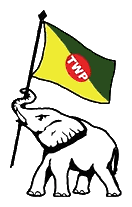
The True Whig Party (TWP), also known as the Liberian Whig Party (LWP), is the oldest political party in Liberia and Africa as a whole. Founded in 1869 by primarily darker-skinned Americo-Liberians in rural areas, its historic rival was the Republican Party. Following the decline of the latter, it dominated Liberian politics from 1878 until 1980. The nation was virtually governed as a one-party state under the TWP, although opposition parties were never outlawed.

Edward James Roye was a Liberian merchant and politician who served as the fifth president of Liberia from 1870 until his overthrow in the 1871 Liberian coup d'état and subsequent death. He had previously served as the fourth Chief Justice of Liberia from 1865 until 1868. He was the first member of Liberia's True Whig Party to serve as president.

Arthur Barclay was the 15th president of Liberia from 1904 to 1912.
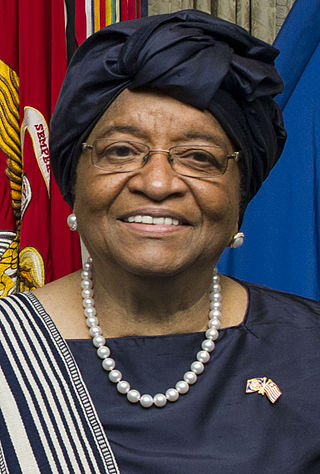
Ellen Johnson Sirleaf is a Liberian politician who served as the 24th president of Liberia from 2006 to 2018. Sirleaf was the first elected female head of state in Africa.

The Legislature of Liberia is the bicameral legislature of the government of Liberia. It consists of a Senate – the upper house, and a House of Representatives – the lower house, modeled after the United States Congress. Sessions are held at the Capitol Building in Monrovia. Legislature of Liberia is considered one of the three branches of government based on the Article III of the Constitution of Liberia that stipulates all three branches ought to be equal and coordinated based on the Principle of checks and balances.
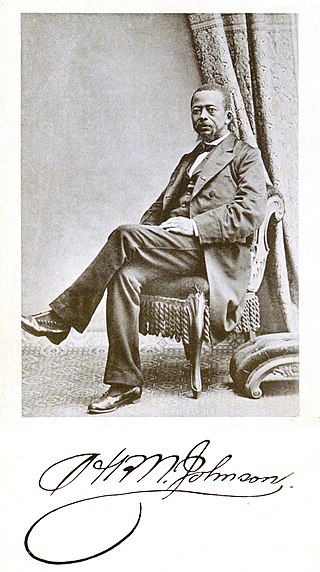
Hilary Richard Wright Johnson served as the 11th president of Liberia from 1884 to 1892. He was elected four times. He was the first Liberian president to be born in Africa. He had served as Secretary of State before his presidency, in the administration of Edward James Roye.

The vice president of the Republic of Liberia is the second-highest executive official in Liberia, and one of only two elected executive offices along with the president. The vice president is elected on the same ticket with the president to a six-year term. In the event of the death, resignation or removal of the president, the vice president ascends to the presidency, and holds the position for the remainder of their predecessor's term. The vice president also serves as the president of the Senate and may cast a vote in the event of a tie. The current vice president is Jeremiah Koung, serving under president Joseph Boakai. He began his term on January 22, 2024.

James Skivring Smith was a Liberian politician who served as the sixth president of Liberia from 1871 to 1872. Prior to this, he served as the eighth vice president of Liberia from 1870 to 1871 under President Edward James Roye and as Secretary of State from 1856 to 1860 in the cabinet of President Stephen Allen Benson. He was a member of the True Whig Party.

General elections were held in Liberia in 1855 to elect the president of Liberia, with incumbent president Joseph Jenkins Roberts declining to run for a fifth term in office.

General elections were held in Liberia on 7 May 1867. The presidential election resulted in a victory for James Spriggs Payne of the Republican Party, defeating Old Whig candidate Edward James Roye. The election was very close, with the House of Representatives required to decide the final outcome.

General elections were held in Liberia in May 1871.

A referendum on the length of terms of office was held in Liberia on 3 May 1870. After the political dispute that had followed the disputed result of a similar referendum the previous year, the Legislature agreed to resubmit the proposal to the electorate. President Edward James Roye had the votes counted and declared that the referendum had passed. The legislature, the entity legally responsible for counting the votes, declared that the proposal has not passed because an illegitimate officer - the President - had counted the votes and thus the referendum had failed.

The Ministry of Finance is a government ministry of the Republic of Liberia. As of 2024, the Liberian Finance Minister is Boima Kamara, who was appointed in January 2024. The minister is appointed by the President of Liberia, with the consent of Senate of Liberia.
William Spencer Anderson was an African American politician and explorer in Liberia. Originally a barber, Anderson emigrated to Liberia at the age of 20 and within five years had inherited a sugar plantation. He expanded the business and became the largest producer of sugar and coffee in Liberia. Entering politics with the True Whig Party Anderson was selected to be Speaker of the House of Representatives of Liberia, from 1869 to 1871. He undertook an expedition to drive a road from Monrovia to Moussodougou in what is now Burkina Faso but he was forced to abandon the attempt. Returning to Monrovia, Anderson successfully negotiated a $500,000 loan for the government from British financiers. However he received criticism for the terms of the loan and was arrested. He was assassinated on 27 September 1872.
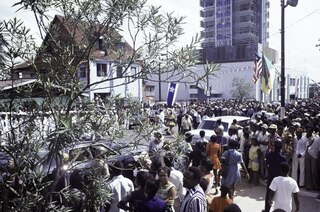
The Edward J. Roye Building is a wrecked skyscraper on Ashmun Street in the commercial district of Monrovia, the capital city of Liberia. Constructed as the headquarters of the True Whig Party, it was renamed the "E.J. Roye Memorial Building" in 1964. It is one of the most prominent buildings in the city. In the building's earlier years, it included a grand auditorium, and before the 1980 coup d'état, it hosted government meetings such as sessions of the Legislature in 1975, as well as non-governmental conventions such as the Liberian Federation of Trade Unions in 1977. It sits in the heart of the city's pre-coup commercial district, near locations such as the former offices of the American Colonization Society.
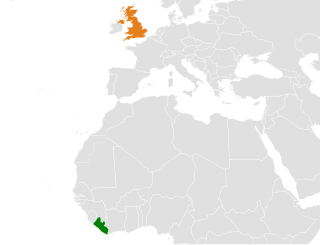
Liberia–United Kingdom relations refer to the bilateral relations between Liberia and the United Kingdom. The United Kingdom was the first country to recognize Liberian independence. Liberia has a history of border disputes with the British Colony of Sierra Leone, as well as cumbersome British loans which have at times compromised Liberian sovereignty.
The 1871 Liberian coup d'état, also known as the Roye affair, resulted in the overthrow and death of President Edward James Roye of the True Whig Party and his eventual replacement by Joseph Jenkins Roberts of the Republican Party.














